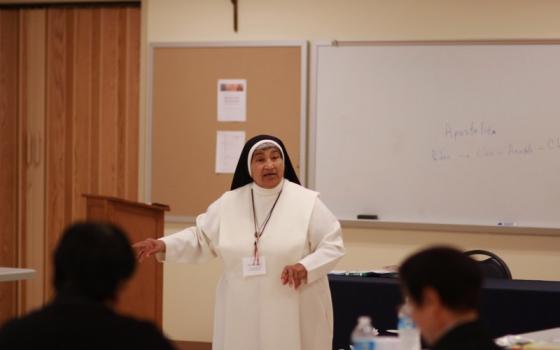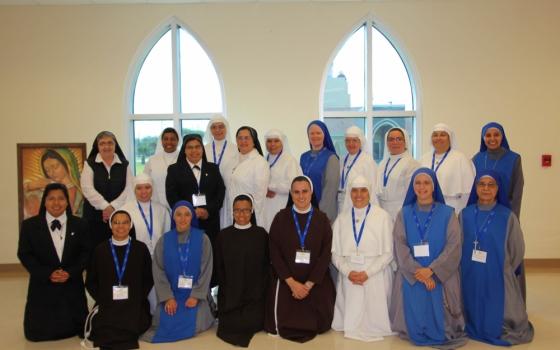For two weeks every summer, women religious from various dioceses and communities come together to teach and study renewal courses intended for their spiritual formation. But this program is entirely in Spanish — a unique opportunity for most who participate.
A result of the Council of Major Superiors of Women Religious' Intercultural Outreach Committee, the program Esposas de Cristo, Hijas de la Iglesia (Spouses of Christ, Daughters of the Church) will host its third gathering July 17-28 in upstate New York in Hopewell Junction.
The sister-run courses focus on a theme specifically picked to re-energize and remind attendees of the spirituality rooted in their pastoral work. This year's subject will be on the four female doctors of the church, while previous themes covered early Christian authors and merciful women saints. All courses and activities are in Spanish.
"We have to know who we are and love what we do in a reflective and deep way so that we can then look at the tools we're using and the means of our service and love," said Sr. Maria Theotokos Adams, a Servant of the Lord and the Virgin of the Matará who helped initiate the courses. "But those are two parts of a whole. You can't do without being first, and that part sometimes needs to rest."
Participants have included sisters who are originally from Mexico, the Dominican Republic, Colombia and Argentina, "so everyone brings their own musical interests and cultural backgrounds."
"Usually you don't get this kind of material in Spanish," said Mercedarian Sr. of the Blessed Sacrament Theresa Gomez. "It's usually translated from English, so it loses some of its flavor."
The shared Spanish is no small detail: Adams said speaking the language with those who often don't have fellow Spanish-speaking sisters in their communities or ministry "does something right away" regarding energy, unity and solidarity among participants.
A place for 'personal formation and spiritual growth'
In 2012, Council of Major Superiors of Women Religious (CMSWR) began the Intercultural Outreach Committee, whose "whole premise is to further CMSWR's commitment to our culturally diverse members and offer resources for their intellectual and spiritual development," said Sr. Megan Thibodeau of the Society of Our Lady of the Most Holy Trinity, chair of the committee.
"It's an opportunity for women religious, no matter what their ethnicity, to have a place to further their own personal formation and spiritual growth."
As an initiative for the Year of Consecrated Life in 2015, Esposas de Cristo was intended to be a renewal for ongoing formation for Spanish-speaking women religious in the United States: Anglo or Latina, from CMSWR, the Leadership Conference for Women Religious (LCWR) or not a member of a conference.
"We said, 'What are things that are both close to the life of a consecrated woman and at the same time universal to all of us and our charisms?' " Adams said. "It would be a change from the daily demands of the pastoral work that so many sisters are involved in, especially Hispanic sisters, who had been invited to work and to serve in the U.S.
"There are lots of programs and ways to work more in your pastoral experience, but we wanted to see a way in which the aspect of consecration could be honored and encouraged and a place of rest and renewal. That was key."
This year, the courses are open to 40 sisters who have professed their perpetual vows; in previous years, the program was limited to about 25 each summer. The classes are kept small intentionally so sisters can get to know each other.
"It was like being in college all over again, but this time, with Spanish-speaking sisters," Gomez said.
The tools the courses provide, Adams said, are at the core of their consecration, focusing more on the spiritual than the pastoral.
"Since our pastoral work flows from the consecration, the energy and enthusiasm and innovations that [a sister] brings to her pastoral work really spring from her relationship with Jesus Christ," she said.
"Sometimes we can get caught up in the daily bureaucracy and daily details that make up our pastoral work, but getting back to basics has been a way of sharing in common what is specific to each congregation."
That the same congregations send different attendants every summer, the sisters agreed, speaks to the program's popularity.
"The sisters who attended from all different backgrounds and institutes were gushing with praise for the opportunity to have this two-week time for personal, spiritual, intellectual formation," Thibodeau said. "There was nothing but thanks and positive feedback."
Classes, networking and volleyball
Spanning two weeks with one weekend in the middle, the program's structure mixes academic sessions, study time, and meals and recreation, all while maintaining "the common rhythm of life together" with Mass and morning prayer, Adams said.
Through the second week, sisters share information and the history of their own communities and dioceses.
"That's always fun because you learn about other sisters, and there's a lot of support and networking that happens organically," Adams said.
Over the weekend, Esposas de Cristo organizes a cultural outing. Since this year's gathering is in New York City, the sisters will visit the shrine of St. Frances Xavier Cabrini, the patron saint of immigrants, and the Met cloisters. Sundays are for volleyball, barbecue and resting.
"I'm one of the older persons, so it was good to see so many young sisters starting out," Gomez said. "It re-energized me."
Courses this year will focus on the four female doctors of the church — St. Hildegard of Bingen, St. Catherine of Siena, St. Teresa of Jesus, and St. Thérèse of the Child Jesus — which Adams said is particularly timely to "Pope Francis' call for us to look to the great gifts and roles of women in the church and women religious, especially."
"It's taught by women religious for women religious, which is very special," she said.
Spanish is not Adams' first language, which she said prompted several sisters to thank her for making the effort to speak Spanish and leave her comfort zone — something Hispanic sisters are constantly called upon to do when they serve their English-speaking communities.
"As an English-speaking, American-born sister getting to give back and share with the Spanish-speaking sisters who are so enriching in our diocese, for me, it's a great joy and honor working side by side with Spanish-speaking sisters in the U.S.," she said.
"I have a lot of gratitude and have learned a lot from them. Missionary immigration — with Poles, Germans, Italians — it's how our church has grown over the years."
For Gomez, the unity among communities is particularly palpable: "Even though we have different charisms and different apostolic work, when we were there, we were one. It was beautiful. You become one, and you begin to see the wonders of you being a sister for the church, not just a sister for the Mercedarians."
A source of renewal
While the previous two courses were in Texas, Thibodeau said Esposas de Cristo will move around the country, starting this year in New York, so sisters who can't afford to travel to one location might have an easier time attending the following year.
Thibodeau added the Intercultural Outreach Committee is also working to digitize the course materials so sisters can use those resources in local workshops.
"It's a sacrifice for sisters to be away from their communities and away from their apostolate, so there's that positive response for the value of the time and experience," Adams said.
She recalled sisters who arrive to Esposas de Cristo clearly exhausted from the daily tasks of their ministry, those who face difficulties in their dioceses and pastoral obstacles. One sister in particular, Adams said, talked about how worn down she was by her daily demands.
"As the days went on, you could see that she was remembering and resting in the joy of her own consecrated life, and that the 'why' for all the work she does is that base of gift of self to Jesus Christ, to his people, and in the beauty of these perennial truths.
"At the end, she said she felt like a different person going back [to her ministry], and that this is God's work."
[Soli Salgado is a staff writer for Global Sisters Report. Her email address is ssalgado@ncronline.org. Follow her on Twitter @soli_salgado.]




